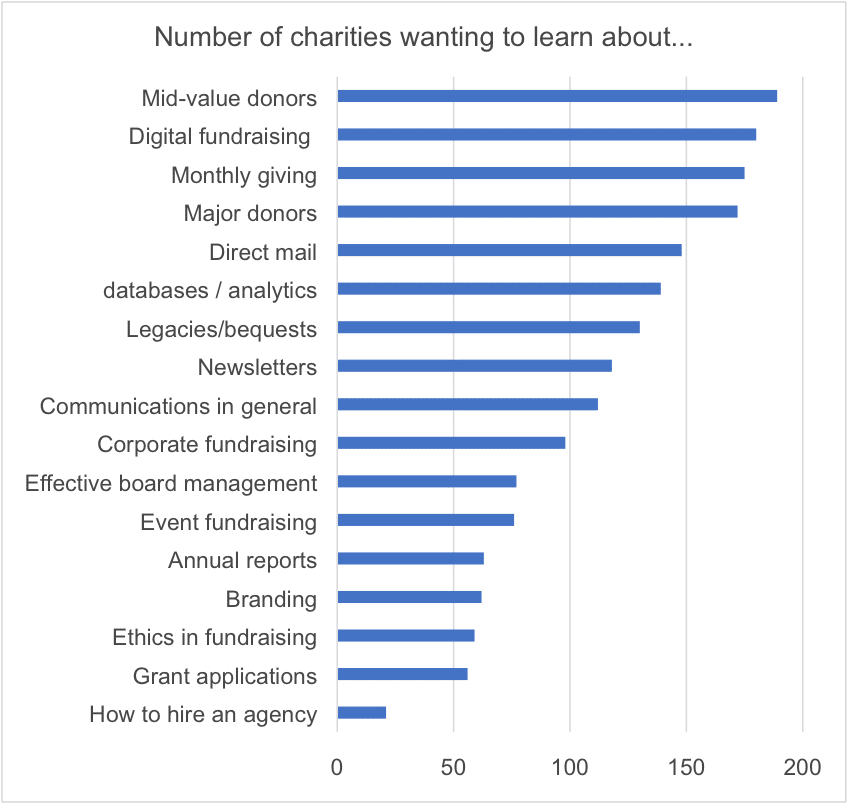Are These Seven Fundraising Woes Yours Too?
When Jeff arrived at Moceanic he offered two free ninety-minute Coaching+ sessions for the two ‘best’ 100-word description of the challenges faced by responders.
We were quite literally inundated with entries from hundreds of fundraisers like you in need of help.
Responses came in from all over the world, from all sorts of charities.
With so many responses (and because I made a mistake with our automated thank you), we extended to four sessions.
I thought it would be useful to you to share some of the recurring themes. I’d love your feedback on them! Do they resonate with you?
Seven themes that really stuck out for me were…
Getting the board or senior management team on board with fundraising.
The number one problem – over 1 in 7 had ‘board’ in their biggest challenge. You may have already read Jeff’s blog about this issue here.
The fundraiser for a successful charity in Minnesota said:
“… Goals that are set unrealistically and based on the organization’s needs, not on the reality of the donor base.” (I kept the ‘z’ in there because she is American, and they spell stuff different to the rest of us).
And a frustrated fundraiser in Australia vented:
“Managing the ridiculous expectations of a board to increase revenue, while they … oppose premiums, list swaps, telemarketing etc… So I guess educating the organisation is my biggest problem.”
Building a culture of fundraising in the organisation.
Strongly related to the board issues were problems with peers and bosses beyond the board.
A fundraiser in Ireland, working for a successful medium-sized fundraising charity, said:
“…The bit that comes less easily is the politics required to maintain the critical underlying conditions where good fundraising can flourish – i.e. (in my opinion) a culture of philanthropy where donor focus, retention, critical thinking, LTV, and leadership are the guiding lights. Culture eats strategy for lunch as they say.”
Over in Australia, someone went further: “Lack of support from other teams, lack of robust processes to support activities and seen as the ‘ugly sister’ of the organisation”.
Time.
Most fundraisers are simply trying to do too much, and want help prioritising or help to get more people.
One UK fundraiser told us:
“Time! I’m happy to ask people for money and know the cause that we have is worth it but finding the time to do it all, or knowing what to do first, is a real challenge.”
Budget.
Even when things are going well, many fundraisers told us they struggle to get an appropriate budget. This connects with board and culture but is worth its own mention.
A fundraiser in Canada told Jeff:
“We are a really small shop. 1.2 mil operating budget. No dedicated fundraising staff. Learning off the side of our desk. Challenge is how to scale without making costly mistakes.”
Reducing attrition of donors (churn).
As an Italian-based fundraiser told us:
“Increase monthly givers by lowering attrition rates (now around 20%) …” And she works at a large charity with very good retention!
And an Australia health charity fundraiser shares the same issue: “Having experienced initial growth, we have now plateaued with new donor acquisition matching attrition.”
Getting case studies.
A Winnipeg fundraiser sums up the feelings of many:
“Internally there is a communication problem between the fundraising office and the programs for which we fundraise, making it a challenge to get connections with our consumers for stories.”
Adequate fundraising training budget.
It really looks like training of fundraisers is rarely a priority for charity bosses. Lack of training is clearly a cause of many of the ills affecting charities. It really beggars belief that charity bosses are surprised or frustrated with their fundraising position when they don’t have adequate training!
One fundraiser in India struggles like their peers in other countries: “Another pressing problem is program restricted funding, making it difficult to carve out support for training, travel and exposure visits for non-programmatic functions like finance, admin, human resources, and fundraising.”
A shocking 20% of fundraisers said they had no training budget at all, with another 73% with less than $10,000 for training. When I factored the number of staff in fundraising the proportions weren’t that much better. For organisations with three or more staff, 91% didn’t have an adequate training budget.
I imagine for many of you there will be a lot of relief that your problems are shared universally! Few are unique to any type of charity, or any country the charity operates in.
Thank you to all those who completed Jeff’s survey. We will use a lot of the information to help drive free content and courses over the coming months for you. As we work out how to help in each area, we will make a specific commitment and pledge and get on with helping you. If we haven’t the skills or knowledge, we will use our extensive network and our wonderful advisory team to find ways to help you.
In the meantime – are any of these issues familiar to you? Please let us know by posting your reply below.
Cheers, Sean
P.S. Here is what fundraisers told us were their training priorities…

P.P.S. Although two lucky charities get a 90-minute session with Jeff, and two unlucky charities get me for ninety minutes, we will be around to help EVERYONE who shares our values with great fundraising training over the coming months. Thank you! And if you would like a free ‘discovery’ call with us, please click here to book one right now!










